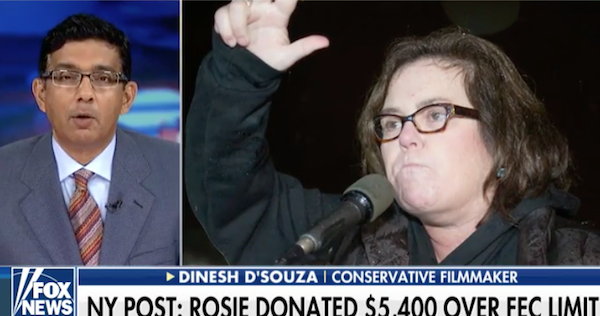
Rosie O’Donnell may be in a bit of trouble with the Federal Elections Commission. It seems that the mostly unemployed koosh-throwing Trump-hater has exceeded the federal $2,700 limit on five separate candidates.
“I Was Not Choosing To Over-Donate.”
“Nothing nefarious,” Rosie told the New York Post after her over-donations were revealed. Her excuse? “I was not choosing to over donate.”
“If 2,700 is the cut off — (candidates) should refund the money,” she added. “I don’t look to see who I can donate most to … I just donate assuming they do not accept what is over the limit.”
The report claims that the Trump critic used fake names and addresses in the five donations that exceeded the limit of $2,700 per candidate.
Conservative filmmaker Dinesh D’Souza, who was convicted of making an illegal campaign contribution in 2014, posed the question on Fox & Friends Monday morning on whether or not O’Donnell would face charges for her alleged crimes.
“It seems clear from what we know, that Rosie broke the law and she broke the law five times,” D’ZSouza said. “So it’s in a sense an egregious violation.”
Alabama Sen. Doug Jones received $4,700, Pennsylvania Rep. Conor Lamb $3,600, with another $1,000 for his run for a full two-year term in a different district this fall; Illinois congressional candidate Lauren Underwood received $4,200; Omar Vaid, a congressional candidate from New York City, received $3,450; and Rep. Adam Schiff, the House Intelligence Committee’s ranking Democrat got $2,950.
As of Saturday, when the Post published the piece, only one of the campaigns (Lamb’s) announced it was returning the money.
O’Donnell also blamed the confusion on donation platform ActBlue, which she thought limited her donations to what the federal limit was.
However, it likely would have been difficult for them. Why? O’Donnell used four different names and five different addresses, which likely made it difficult to track and raises the specter of whether she was trying to conceal the over-donations.
Indeed, it seems ludicrous that O’Donnell, a longtime Democrat donor who has already given $90,000 in donations during the 2017-2018 cycle, would be unaware of federal donation limits.
However, it’s rather unlikely she’ll face any punishment.
“Donors are rarely fined for excess contributions and then only if they are hiding the donations from the recipients,” Jan Witold Baran, a Washington, D.C., campaign finance lawyer, told the Post.
“Campaigns generally are not penalized for isolated contributions over a limit. However, multiple excessive donations may lead to an investigation … Fines could result in such cases.”
So, apparently, she won’t be treated like Dinesh D’Souza.
The conservative pundit committed a very similar infraction. As Townhall noted, during the 2012 elections, D’Souza requested a few friends donate $10,000 each to a congressional campaign on his behalf. He later paid them back the money.
D’Souza faced eight months in a halfway house, as well as five years of probation and a $30,000 fine for the offenses, which he pleaded guilty to.
“I can’t help but think that (D’Souza’s) politics have something to do with it,” law professor Alan Dershowitz noted at the time. “It smacks of selective prosecution.”
In a 2014 editorial arguing against the prosecution of D’Souza, The Washington Times noted that “Mr. Obama’s 2008 presidential campaign was itself fined $375,000 in 2013 for failing to disclose millions of dollars in contributions and missing deadlines for refunding millions in excess contributions. No one was threatened with prison for that. (That was different, of course.)”
And yet, prosecuted he was, despite the fact that what he did — asking friends to donate for him — pales in comparison to using different names and addresses to escape detection.
If prosecutors were interested in D’Souza, they should be doubly interested in what Rosie did.
D’Souza has been joined in the selective prosecution category by a slightly higher-profile Republican, Donald Trump. Robert Mueller’s special counsel, originally set up to determine whether Russia interfered in the 2016 election, has now essentially collapsed upon Trump lawyer Michael Cohen and whether the $130,000 he paid a media-friendly porn star for a non-disclosure agreement constituted a loan to the Trump campaign. If it did, we are loudly told by the suzerains of the media, Donald Trump must be impeached.
Rosie O’Donnell and Barack Obama’s campaign officials, meanwhile, are likely in the clear. Even though both Rosie and the Obama campaign almost certainly knew what the law was and that they were violating it, the rules are different for them.
What a surprise.”
